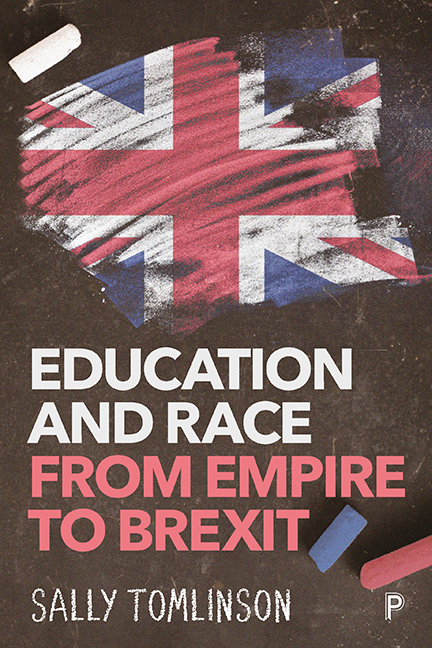Book contents
- Frontmatter
- Contents
- Acknowledgements
- List of abbreviations
- Introduction
- 1 Empire and ethnocentric education
- 2 Internal colonialism and its effects
- 3 Ending empire: Education for ignorance, 1945-1960s
- 4 Post-imperial anxieties and conflicts, 1970-90
- 5 Inequalities, a European Union and education markets, 1990-97
- 6 New Labour: Wars, race and education, 1997-2005
- 7 Not so New Labour: Race and education, 2005-10
- 8 A divided society: Race, class and education, 2010-16
- 9 A dog’s breakfast Brexit, 2016-18
- References
- Index
8 - A divided society: Race, class and education, 2010-16
Published online by Cambridge University Press: 27 April 2022
- Frontmatter
- Contents
- Acknowledgements
- List of abbreviations
- Introduction
- 1 Empire and ethnocentric education
- 2 Internal colonialism and its effects
- 3 Ending empire: Education for ignorance, 1945-1960s
- 4 Post-imperial anxieties and conflicts, 1970-90
- 5 Inequalities, a European Union and education markets, 1990-97
- 6 New Labour: Wars, race and education, 1997-2005
- 7 Not so New Labour: Race and education, 2005-10
- 8 A divided society: Race, class and education, 2010-16
- 9 A dog’s breakfast Brexit, 2016-18
- References
- Index
Summary
The materialistic and selfish quality of contemporary life is not inherent in the human condition. Much of what appears “natural” today dates from the 1980s: the obsession with wealth, the cult of privatisation and the private sector, and the growing disparities between rich and poor. (Judt, 2010: 2)
More damage was done to Britain's schools and universities in the few years from 2010 to 2016 than at any other period in British history, albeit most of this damage was enacted in England. (Dorling, 2018: 10)
Even in rich developed countries inequality and the poor are apparently always with us. But, as Judt has pointed out, this is not natural at all. The Poor Laws in 1834 had one answer to poverty – people had the ‘choice’ to work for miniscule wages or face the workhouse. The UK in the 20th century eventually managed to follow some social democratic ideas of equality similar to those of its European neighbours, and by the 1970s had become one of Europe's most equitable countries. From 1980, that all changed. Governments in the UK, led by Thatcher, Blair and Brown, and from 2010 to June 2016, by David Cameron, followed policies that increased inequalities, the justification being that free markets and privatisation encouraged enterprise and wealth creation. There was never any acknowledgement that Britain had previously become rich by exploiting the wealth and labour of the Empire. With the British Empire gone, politicians claimed that the country would benefit from economic globalisation that increased flows of capital, labour, goods and services around the world, resulting in higher living standards for all. The World Trade Organization (WTO) was established in 1995 to fix fairer trade rules between countries, which would supposedly solve future global trading problems. What actually happened in the UK was that free markets and shrinking state institutions increased the gap between the rich and poor, and by 2016 wealth and income inequalities were the highest in Europe. As Danny Dorling pointed out in his book Inequality and the 1%, by 2014, to qualify for being in the top 1%, a childless couple would need an income of £160,000 a year, the average income being £23,000 (Dorling, 2014).
- Type
- Chapter
- Information
- Education and Race from Empire to Brexit , pp. 175 - 200Publisher: Bristol University PressPrint publication year: 2019



